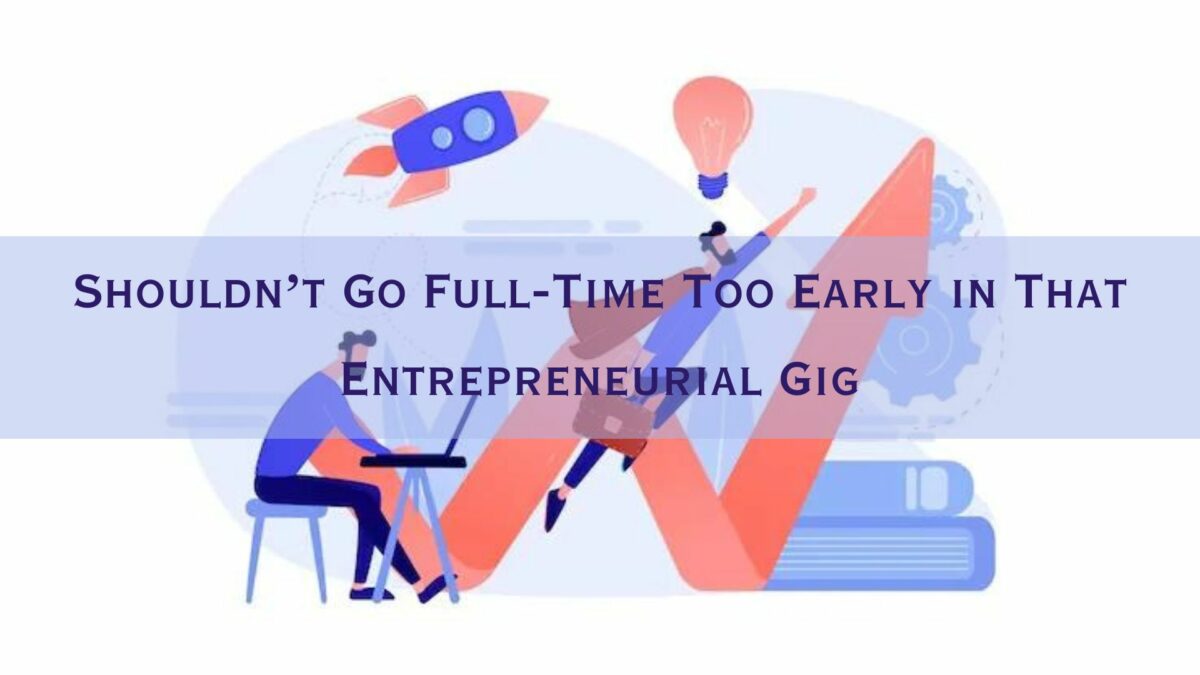“Genius always finds itself a century too early.”
– Ralph Waldo Emerson

Most of the time, I try to style my advice so that it falls under the rubric of “do as I do.”
There is one area where I fail, and my advice is “do as I say, not as I did.”
That advice concerns going full-time in your entrepreneurial ventures.
I have previously outlined my strategy for how much you should invest in a side gig in “An Alternative to Stocks for Your 5% At Risk Capital.”
But, if you are like I was and miserable in your full-time job, the temptation to just jump into entrepreneurship is very high. I gave in. I made the leap.
I then went 18 straight months without getting paid.
So, even though everything ended up about as well as I could have hoped for, the path was all wrong.
It was like my old college calculus tests, where I had to write down all of the steps that got me to the answer. Getting the answer right was only worth part of the credit. The steps were critical, too.
Thus, while we got there and achieved financial independence through the sale of some of my ownership, it could have been an easier trip. I jumped too early into full-time entrepreneurship.
Here’s why you shouldn’t make the same mistake I did.
Reason #1: The opportunity cost is high
If you’re currently at a job where you’re making a decent salary, there’s no reason to ditch that salary for the uncertainty that is inherent with the world of entrepreneurship.
Let’s imagine that you want to make that leap. Say you’re making $50,000 a year. If you make the jump to full-time entrepreneurship, it’ll take 6 months to get to a full-time salary replacement from your new gig. NOTE: These numbers are pulled from thin air. Don’t go expecting to replicate your salary in 6 months. YMMV. If you keep your job and work your entrepreneurial idea as a side gig, let’s say it will take 18 months to get to where you could go into entrepreneurship full-time and replace your salary.
The person who makes the early jump misses out on approximately $64,600 of income.
Reason #2: Most startups fail

According to the Small Business Administration and the Bureau of Labor Statistics, half of small businesses close within the first five years, and two thirds close within the first ten years. Without having a good degree of certainty whether or not your idea is going to find traction in the market, you’re taking a big risk that, in the next ten years, you’re going to have to go out and find another job to replace the one that you left, and you’ll probably have sacrificed a lot of earning and saving opportunities along with it. There’s a real chance that, financially, you’ll be starting over from close to zero, and, as we saw in both “Do You Need to Save Money in Your Twenties” and “Should I Take Shots With My Investments When I’m in My 20s?”, it’s not the home run that will get you to your retirement goals. It’s the steady, constant contributions to your investment and retirement accounts. Even if you only break even for 10 years, neither contributing to or withdrawing from your accounts, you’ve lost a grand opportunity to allow compounding to do its magic, meaning that the return you need for that risk is even higher.
Reason #3: Even if your business keeps its doors open, it may not make enough to pay you a salary
When I started out with my partners in our venture, one of the biggest mental allures to me was a perception that I had that there was a direct correlation between the amount of work I put in and the amount of money we’d earn. If, as we saw in “Is Spending More Time at Work Worth the Salary Increase?” working an extra 25 hours per week only led to a 2% increase in salary, then why not work 65 hours a week on my own stuff and make it all for myself, cutting out the middleman?
I quickly discovered that it wasn’t to be so. I don’t know what the exact relationship between the amount of time I worked and revenues was, but it certainly wasn’t linear. The growth was exponential, but the equation looked more like 2^x rather than x^2.

I’m not the only one who has experienced this situation. According to an American Express survey, only 51% of small business owners pay themselves a salary, and 14% of them need to work a second job to make ends meet.
So, roughly half of the time, you’ll work for no pay. We called that “involuntary non-profit,” and it’s not a situation you want to find yourself in without some significant financial cushion.
Reason #4: You don’t really need to spend 40 hours a week on your new gig

I’mma let you in on a little secret here.
I ran a company that had multi-million dollar revenues and a healthy enough profit to allow me to sell a portion of my shares and achieve financial independence.
Between years 4 and 7, I usually averaged about 16 hours a week working.
This wasn’t because I was some Tim Ferriss case study from The Four Hour Workweek, though I have read the book and really enjoyed it.
It’s because that’s all that was needed to do the job.
We could only grow so fast and deliver on the quality that we wanted to deliver and that our customers expected from us.
Plus, it’s not like many marketing campaigns have immediate and measurable effects.
Marketing is, in most cases, additive. You add bit by bit until you have enough sway and influence to cause someone to buy something from you.
Sure, there were times when I was pulling all-nighters and working crazy weekends and late hours. There was definitely a rough patch as we lost our first huge customer and had to scramble to find replacement revenues.
But, for the most part, it was about 16 hours a week.
Theoretically, I could have had another side gig running at the same time, even though I didn’t.
Am I some hyper-efficient savant?
Far from it.
But, I am quite aware of the Pareto rule: 80% of the results come from 20% of the work.
I tried to do what was important and avoid what wasn’t important.
If you do that, then you don’t need 40 hours a week unless you’re selling your own personal services.
When you talk to entrepreneurs, they all seem to sing the same song:
I’m so busy! There’s so much to do!
Next time you hear that, dig a little deeper.
Ask
What exactly do you do with your time? How are you measuring the direct impact of the time spent to your bottom line?
Expect tap dancing.
So, why leave that full-time job when, at least for the first while, the entrepreneurial gig doesn’t require your full-time presence?
How many entrepreneurs started up business and had a flood of customers the first day?
How many of them opened the doors to the sound of crickets?
I suspect that there are many more of the latter than the former.
The small business failure statistics and the low percentage of small business owners who can afford to pay themselves attest to the crickets theory.
Don’t leave your job for crickets.
Have you been bitten by the entrepreneurship bug? Let’s talk about it in the comments below!
Author Profile
- John Davis is a nationally recognized expert on credit reporting, credit scoring, and identity theft. He has written four books about his expertise in the field and has been featured extensively in numerous media outlets such as The Wall Street Journal, The Washington Post, CNN, CBS News, CNBC, Fox Business, and many more. With over 20 years of experience helping consumers understand their credit and identity protection rights, John is passionate about empowering people to take control of their finances. He works with financial institutions to develop consumer-friendly policies that promote financial literacy and responsible borrowing habits.
Latest entries
 BlogJuly 8, 2024How to Fast-Track Approval for Section 8 Vouchers
BlogJuly 8, 2024How to Fast-Track Approval for Section 8 Vouchers BlogJuly 8, 2024Unlock Apple Business Credit with No Credit Check Needed
BlogJuly 8, 2024Unlock Apple Business Credit with No Credit Check Needed BlogJuly 8, 2024A $18 Million Per Year Investment Plan for Democrats to Control the Texas House
BlogJuly 8, 2024A $18 Million Per Year Investment Plan for Democrats to Control the Texas House Low Income GrantsSeptember 25, 2023How to Get a Free Government Phone: A Step-by-Step Guide
Low Income GrantsSeptember 25, 2023How to Get a Free Government Phone: A Step-by-Step Guide

